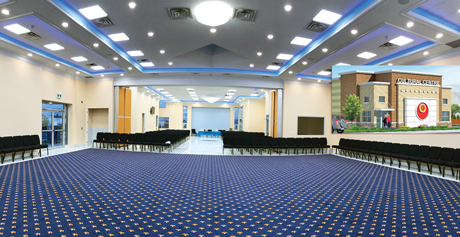Bharat Sevashram Sangha

On Saturday June 15, 2019 all of that has started to recede into the realm of a distant memory. With the inauguration of its new contemporary, 12,000 sq ft architecturally forward-looking cultural centre, the Sangha made a quantum leap in its physical stature belying the fact that it is a Hindu organization headed by a spiritual brotherhood of self-sacrificing monks, all renunciates (Swamis) dedicated to giving service (seva) to the world without expectation of reward and to alleviate human suffering.
In contrast to this significant accomplishment in this year of 2019, the Sangha’s founder, the venerated Swami Pranvanandaji Maharaj, himself a renunciate and trailblazer whose ultimate mission is to bring about emancipation through inner awaking, started his movement exactly 100 years ago in a modest thatch-roofed mud hut in a remote tiger-infested jungle in today’s Bangladesh. The Sangha’s Canadian devotees can justifiably feel that they deserve the special blessings of that Godman for their monumental contribution to furthering his mission.
The June 15 inauguration was awe-inspiring and devotion-laden, attended by over seven hundred devotees, friends, donors, well-wishers and guests who came from across Canada as well as overseas. It was also graced by the presence of over a dozen monks from the Sangha’s headquarters in India.
Bharat Sevashram Sangha which has hundreds of branches across the globe was introduced to the West by Swami Purnanandaji Maharaj. Ex-students of the Hindu College in Guyana which was pioneered by the Swami, constitute the main source of personnel and inspiration behind this Canadian venture. And in keeping in line with the educational underpinnings of the Guyana establishment, the organizers plan to utilize the new facilities for higher level learning in addition to promoting the Sangha’s mandate of service and spiritual development.
yet to meet
Georgetown – Following its decision to uphold the December 21, 2018 motion of no-confidence against the APNU+AFC government, and its ruling that the appointment of Chairman of the Guyana Elections Commission retired Justice James Patterson was unconstitutional, the Caribbean Court of Justice (CCJ) had, on June 18, invited submissions from all the parties in relation to the consequential orders it should issue.
President of the Court, Justice Adrian Saunders, had told both sides that written submissions must be provided by July 1st and the court will make a decision on the consequential orders by July 12th. This decision came after the court had expressed the hope that the two parties would have met and discussed the way forward by June 18th but this did not occur.
At that June 18th hearing, the oral submissions from the two sides varied greatly in what they expected the court to issue in terms of consequential orders.
At several points, Justice Saunders expressed his exasperation with the dilatory manner in which Guyana’s leaders and their counsel have approached the matter of arriving at a consensual decision on these important matters. He said: “These matters are of the highest constitutional significance…It beats me that the Leader of the Opposition and the President and their respective counsel cannot meet to address the issues that confront us…”
Government and the opposition were expected to deliver written submissions to the CCJ on Monday, but they are yet to meet to discuss or agree on any of their individual proposals.


